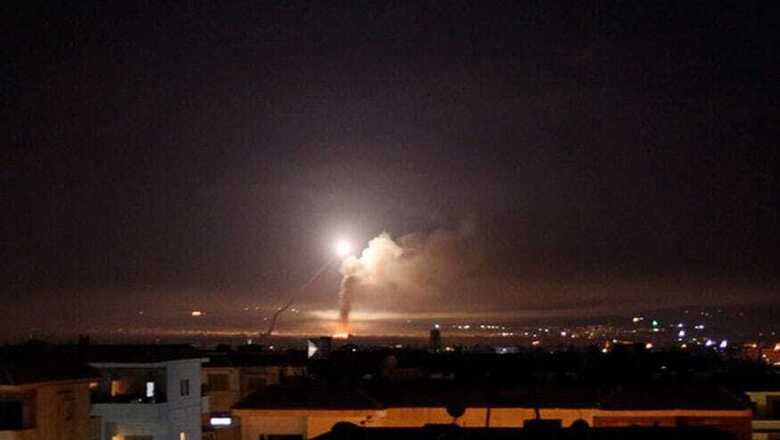
views
Jerusalem: In the largest operation in Syria since the signing of disengagement agreement in 1974, Israel on Thursday said it has struck almost all of the Iranian infrastructure on Syrian soil during the overnight raids in retaliation to a barrage of rocket fire on its territory by Iran.
The Israel Defence Force (IDF) claimed that the overnight clash, the largest-ever direct clash between the Iranian and Israeli armies, was a setback to Iran's military capabilities by "many months".
Israel's Defence Minister Avigdor Lieberman said that his army struck "almost all of the Iranian infrastructure in Syria" overnight in response to a rocket barrage at its military outposts in the Golan Heights by Iran.
Asserting that Israel does not want an escalation, Lieberman said that Israel won't allow Iran to turn Syria into a "forward base" against his country and that, Israel has no desire to expand their military presence to create new proxies and fronts.
"If it rains on us, it will pour on them," he said in a stern warning to Iran.
"I hope we finished this chapter and everyone got the message," he said, adding Iran was truly the only country today that represents extremism, not just ideologically but also in its willingness to sacrifice its citizens, sacrifice its future for this same extremist ideology.
He also confirmed that no rocket landed in the Israeli territory.
An army spokesman said that four of the 20 rockets fired on Israel were intercepted by the iron dome anti-missile system and 16 fell within Syrian territory.
The IDF suffered no casualties, either on the ground or in the air, and that no rockets fired from Syria made any impact in Israeli territory, the spokesman said, adding that "all of our planes returned home safely".
It was the "largest such operation (by Israel) against Iranian targets," it added.
"All targets that we engaged were effectively destroyed, causing significant damage to the Iranians," the spokesperson said.
The Agreement on Disengagement was an agreement between Israel and Syria, signed in May 1974, which officially ended the Yom Kippur War and the subsequent attrition period on the Syrian front.
The Israeli military accused the Iranian Revolutionary Guards' Al Quds force and its commander, Maj. Gen. Qassem Soleimani, of launching the attack at the Israeli Golan Heights.
This is the first time that Israel has directly accused Iran of firing on its territory.
Defence sources here said that Israeli operation targeted weapons storage, logistics sites and intelligence centres used by elite Iranian forces in Syria.
Five Syrian air-defence systems were also destroyed after coming under heavy fire, they said, adding none of the Israeli warplanes were hit.
Russia is reported to have been informed in advance of the Israeli attack.
There was no immediate word on Iranian casualties but according to reports in the regional media, there were several casualties as a result of the Israeli strike and that explosions were heard near the Syrian capital, Damascus.
The rocket barrage was fired from Syria at Israel at around midnight.
The Syrian Observatory for Human Rights reported a little later that Israel has attacked targets of the Syrian military on the outskirts of Quneitra in the Golan Heights.
Siren alerts were sounded soon around midnight in the north and centre of the Golan Heights in northern Israel.
The Home Front Command released a reminder on safety regulations to residents of the area with shelter houses remaining open in case of an escalation.
The Golan Regional Council released a statement, saying that several towns in the Golan were targeted by rocket fire and that residents of those towns are requested to stay in shelters until notified otherwise.
Israel had been bracing for a possible Iranian "revenge" attack after the Islamic Republic accused the Jewish state of having attacked one of its bases in Syria on April 9 in which nine Iranian commanders were said to have been killed. Israel did not confirm or deny its involvement in that attack.



















Comments
0 comment